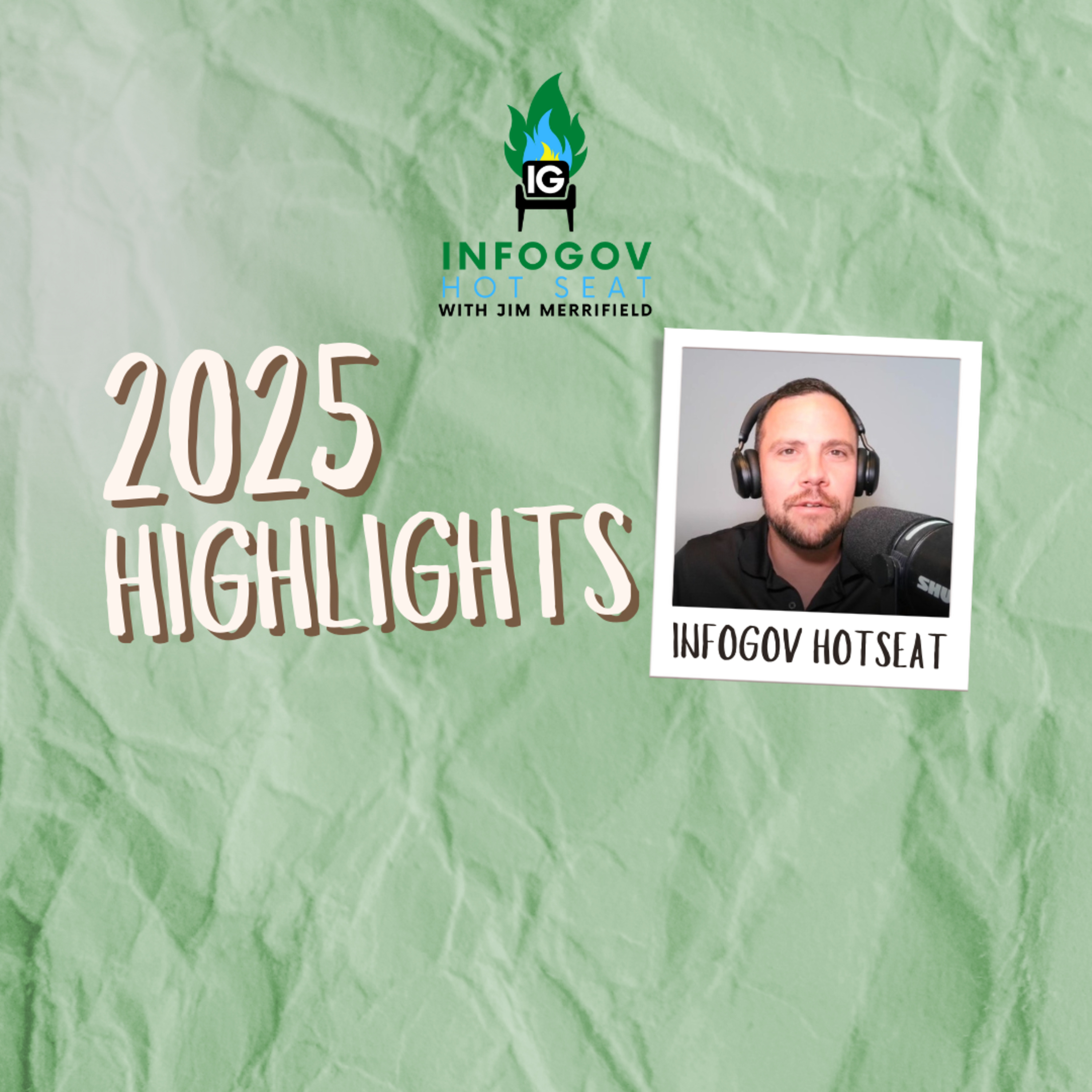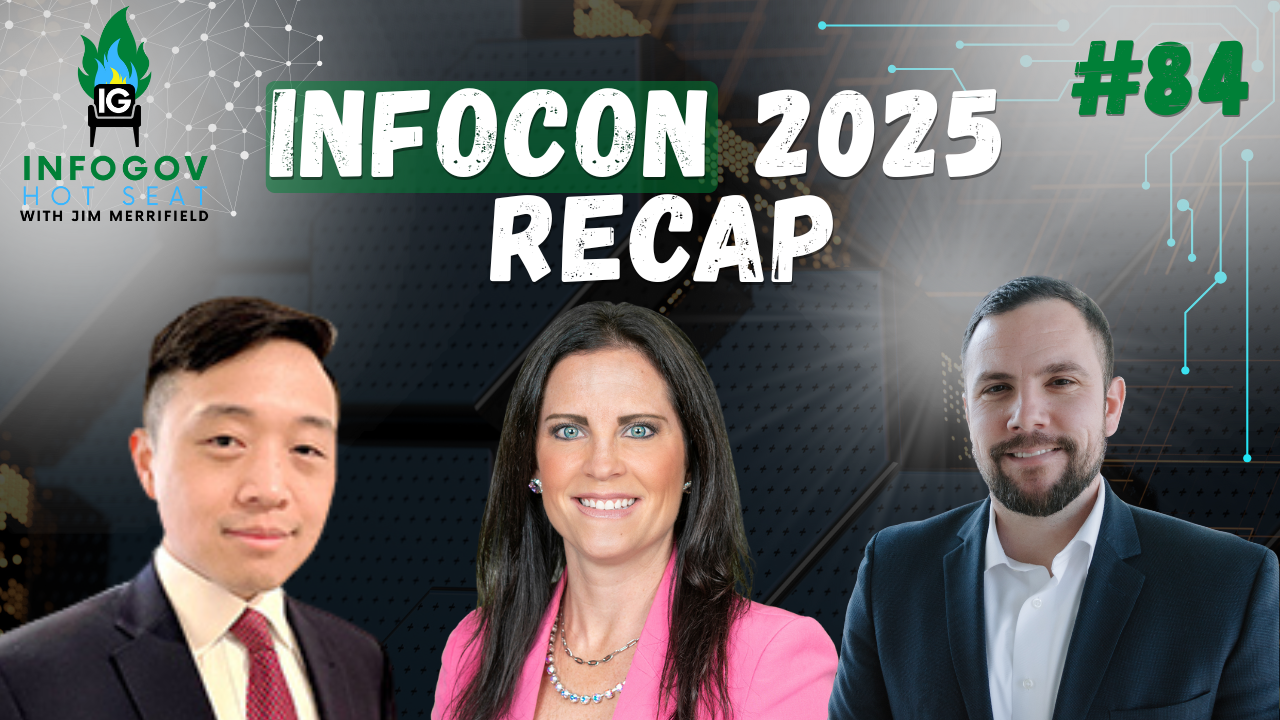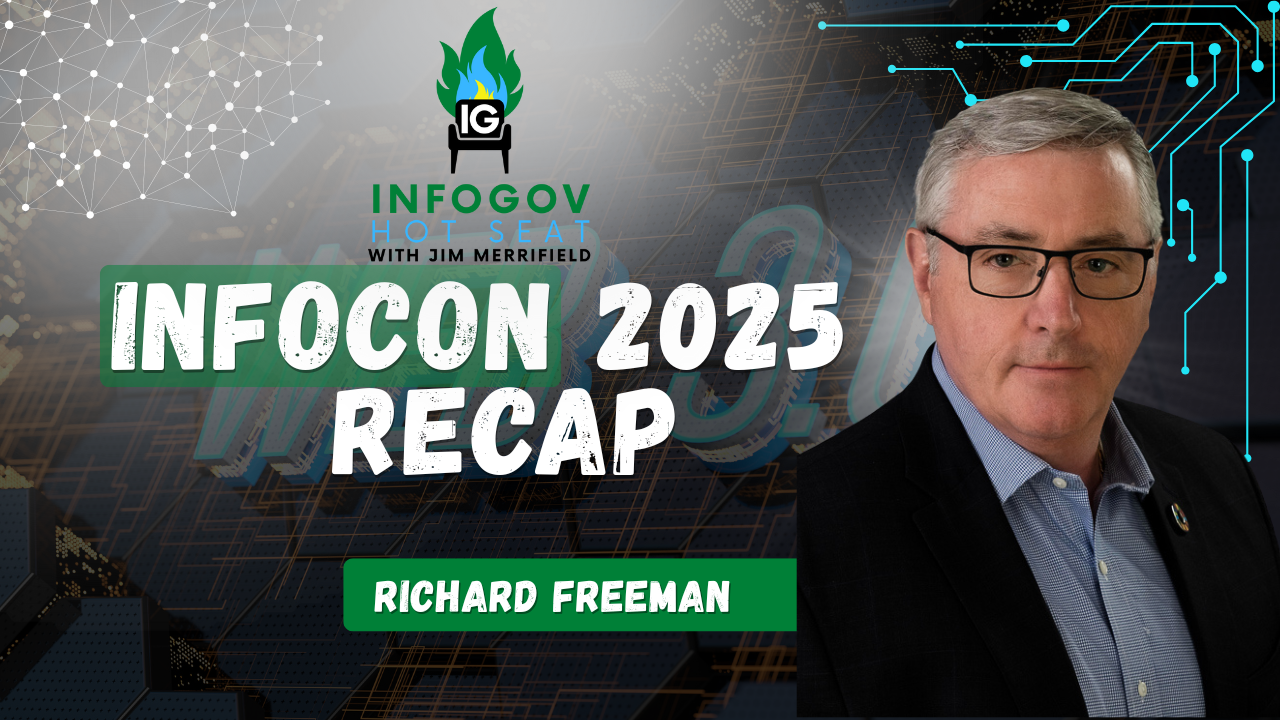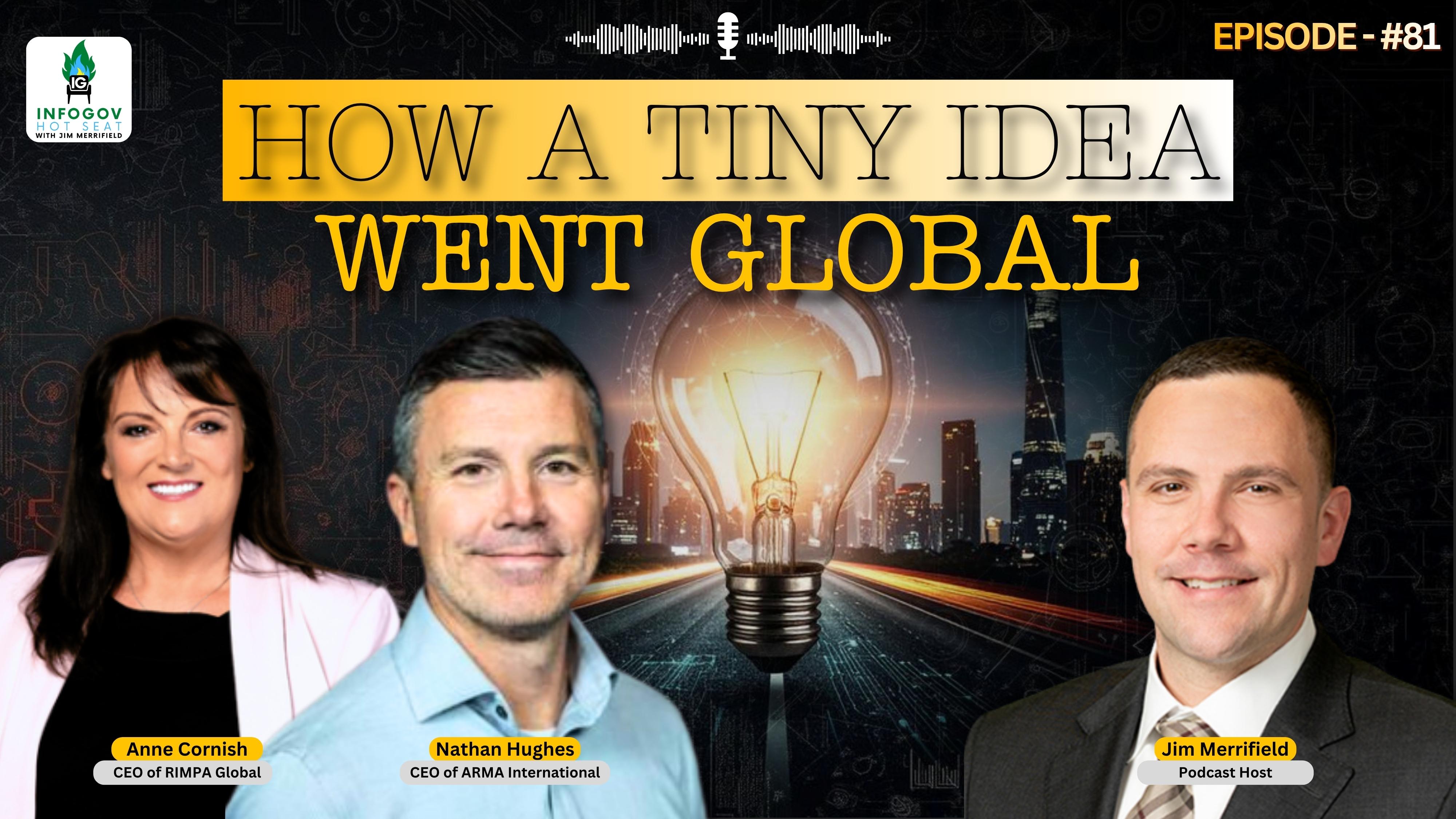IGHS26 - Jaki Stockwell, Leadership Through Data
In this conversation, Jacqueline Stockwell from Leadership Through Data discusses Microsoft 365 training programs, measurable improvements in productivity, interactive learning methods, and the use of Microsoft Copilot and AI technology. She emphasizes the importance of tailoring training programs to meet specific needs, using interactive platforms and gamification to engage learners, and incorporating micro-learning for effective knowledge retention. Jacqueline also highlights the need for organizations to adopt AI technology like Copilot while ensuring proper security measures and user training. She encourages authenticity and creativity in utilizing AI tools and emphasizes the role of human expertise in the process
Jim Merrifield (00:00.662)
Well, hello and Welcome to the InfoGov Hot Seat I'm your host Jim Merrifield and with me today is Jacqueline Stockwell at Leadership Through Data. Welcome, Jaki
Jacqueline Janice Michelle Stockwell (00:09.407)
Hello! Thanks for having me!
Jim Merrifield (00:11.966)
Yeah, it's great to have you on the hot seat all the way from the UK, you know, spending some time on your Friday afternoon with the hot seat audience. Yeah, awesome. I feel special. Well, let's kick this off. Can you tell us a brief introduction to your role and one fun fact about yourself?
Jacqueline Janice Michelle Stockwell (00:19.643)
Only for you.
Jacqueline Janice Michelle Stockwell (00:31.059)
I sure can. So I'm CEO and founder at Leadership Through Data. I set the company up six years ago in the UK, where previously I was an information manager within the National Health Service. I really wanted to give some more enthusiasm and excitement to training within the data protection records management because it's such an important job, but it's also trying to how you can get people involved.
So I set up my company and I know we got a few questions about how we do certain things. So I won't steal all the questions from you. And then we moved because of our Microsoft 365 Records Management course into Australasia. And now we've just hit the US as well. So it's very exciting. So that's me.
Jim Merrifield (01:10.213)
Yeah, no, that's fine.
Jacqueline Janice Michelle Stockwell (01:26.211)
One fun fact is that I like to find old things and give them new life and I've brought you something to show you. So this is an old bike wheel that I like to upcycle things so it becomes a decoration and just behind me are my old kitchen wall cupboards. So I always like to find something new out of something old.
Jim Merrifield (01:38.176)
Oh wow.
Jim Merrifield (01:42.988)
That's awesome.
Jim Merrifield (01:52.702)
Yeah, that's innovative. I love it. I love it now.
Jacqueline Janice Michelle Stockwell (01:54.967)
Thanks. My mind is always going all the time. It doesn't stop.
Jim Merrifield (01:59.938)
Now, well, I know your LinkedIn profile says you're an entrepreneur, right? So that's like the background. You just keep thinking and thinking and implementing and see where it takes you. So, thanks for sharing that. And so let's get into your company a little bit and Microsoft 365 in general. I know it's really hot right now with Copilot and Microsoft pumping out so many articles around Copilot and other things and AI.
So how do you tailor your Microsoft 365 training programs to meet the specific needs and skill levels of individuals and organizations? I know that's a mouthful, but it's like I think there's so much need for M365 training out there. And I know your leadership through data is a training company. Right. So how do you tailor your programs? Talk a little bit about that.
Jacqueline Janice Michelle Stockwell (02:56.775)
Yeah, sure. So there's three aspects from my point of view for this. When we set up, we basically look at what our customers need and what our customers are asking for. We collaborate with associations across the world as well. So what are members requirements? We feed that back into sort of our internal team and we kind of make discussions about what would be the best fit. So we created our records management.
365 course SharePoint in 2019. Now, we launched that because that was what our customers are asking for. Then we found a lot of our customers had gone on to the records management 365 course to learn about potential labels, metadata, security and compliance, how to do their information architecture, and then they didn't know SharePoint. So we then had this whole thing that we-
had to step back a little bit and start creating learning pathways. So we have several learning pathways for where you are in your Microsoft journey. So we've just launched our e-learning platform for all users. So that's for any application for Word, Excel, um, to-do lists. I mean, I thought I knew about to-do, but I've actually done the training course and I've learned a whole load more stuff that I didn't think that I knew about.
But actually, it's then from skill level, so how you can then start to go up that learning pathway. I'm very notorious to say to everybody, I'm not about just selling loads and loads of training courses. We're actually about trying to find the effective pathway for an information manager, a privacy officer. So if you don't know SharePoint, you need to do the SharePoint fundamentals first, before you then start to go into retention labels and metadata. If you're looking at rolling out.
Microsoft 365, you need to design your information architecture first. Like if you're looking at your, um, uh, labeling, your sensitivity labeling, you know, you need to have made sure you've done SharePoint first, and then you then kind of move on because then how will you understand how the eco kind of system works? And it's the same thing within all of our courses we tailor make for the people within the course. So.
Jacqueline Janice Michelle Stockwell (05:17.235)
where we've designed the courses, we've designed it around learning styles. So we use pictorial pictures. I'm dyslexic, so I learn completely different. I'm very visual. I learn by group discussions. And actually you can learn so much more from other people than you can just from the trainer there. It's like sharing knowledges. So it's about allowing that space within the training environment. And there's also that practical...
hands-on, so the case studies or the, you know, this is how you apply retention label in Microsoft 365. Or, you know, we have designed Cluedo, so the gamification aspect inside our environment. So everybody's, I think you guys call it Clue or Cluedo. But we call it Cluedo in the UK. But you have Miss Scarlett, Professor Plumb in Tudor Hall, and you'll kind of get the...
Jim Merrifield (06:13.646)
All right, clue. Yep.
Jacqueline Janice Michelle Stockwell (06:14.667)
Clue, yeah, I thought you called it clue. And the reason why we've done that is that the more advanced people going on to a course can look for the murder within the SharePoint environment, but the people that aren't so advanced will then kind of work towards the training courses. So we're always trying to adapt skill levels within each of our training.
Jim Merrifield (06:39.27)
That's great. That's great. You mentioned Now I love it I love it you mentioned, you know Microsoft to do I use that every day So I'm gonna have to check out that It may be some fun Tricks and tips and things like that, you know, I use that every day just to keep it's almost like a virtual checklist, right? Great
Jacqueline Janice Michelle Stockwell (06:40.007)
Is that alright or did I just talk too much?
Jacqueline Janice Michelle Stockwell (06:57.595)
It is and I talk about, I'm just going to digress here a minute, I talk about a learning curve which basically you start from your comfort zone. If you're in your comfort zone you then kind of come down when you're learning a new skill and then you go up and then you go into like an expert zone. And it's the same thing with like education or in any walks of life not just education but you used to do.
But actually, probably if you did a to-do course, you'd probably find some more functionalities that you wouldn't know that were available to you because you're set in your comfort zone where you are in using to-do. So it's all about kind of like that, I always say growing your mind, let's grow our minds.
Jim Merrifield (07:42.194)
Yeah, no, it's good. Learning is good and it's good for the mind. So you mentioned in your comments about case studies, right? So can you provide examples of real world scenarios or case studies where your training led to measurable improvements in productivity or efficiency for an M365 user?
Jacqueline Janice Michelle Stockwell (08:02.631)
I can do and for that question I want to talk about people. So there's two customers. One of my first customers in the UK that attended the first records management 365 course. Met him in person, wanted to roll out the course. And he was working for an organization that wanted to roll out Microsoft. So he came to the course, he knew some knowledge.
but he didn't know the practical application of that knowledge. So he worked through the course and he went back to his organisation and he actually then started to roll out the Microsoft 365 programme. And the one thing it did is it gave him empowerment, it gave him autonomy, it gave him understanding and actually allowed him to have a seat at the table to talk to IT and say actually this is what's needed from an information management perspective.
And that in itself is, for me, is the most powerful thing because when we've got new knowledge, we can actually turn up to those conversations and be confident about what we're saying. He then went on, he left the organization and then went on and did the same thing again to another organization. Just because the way that he attended our training, again, in that power man, he got that project, those skills.
through the organisation and then decided to leave and do the same thing in another organisation as well. We had another customer in Australasia, pretty much the same thing, and they've taken on a two-year life cycle. So a lot of people think it's gonna be a really easy thing when you implement Microsoft 365. We can do that in three months, and that's not the case. So it's a long kind of standing project with different key milestones in them.
But that customer in itself wanted, he went through all the Microsoft stack. So we have a, as I said about our learning pathways. So he went through them all. He upskilled himself before they ventured into the Microsoft 365 landscape. They've now spent a long time doing their information architecture, designing that kind of ecosystem, how they want it to function. And now they're deploying it. And I think from.
Jacqueline Janice Michelle Stockwell (10:24.731)
a case scenario and a real world scenario, those to me are really important to my heart because it's about the person that's had that impact on the organisation.
Jim Merrifield (10:35.818)
Yeah, you were able to build their confidence and one individual is able to take that to another company. And so, but before he had that confidence and that knowledge, he probably. Didn't have too much empowerment as you, as you said to, to be able to maybe talk to the technical people in the organization and for them to actually listen to. To what he or she had to say. So that's great. Hey, listen, if training is, uh, there's probably nothing, nothing more rewarding for a teacher.
right, to see their students excel and progress and things like that. So it's wonderful.
Jacqueline Janice Michelle Stockwell (11:07.267)
Uhhh...
Jacqueline Janice Michelle Stockwell (11:11.323)
I cried and they actually went and shared their story in the UK with one of the information management professionals conferences. So it was just such a nice kind of, and certainly from being an information manager and starting my own business, you actually kind of want people to get value from your services. I'm an emotional person anyway Jim.
Jim Merrifield (11:33.898)
Yeah, no, that's awesome. That's great. No, it's good to see results, and it seems that you have a lot of passion for this area. So you mentioned interactive learning methods a little bit in the beginning, or platforms. What kind of platforms do you incorporate into your training to ensure engagement and effective knowledge retention? It seems like you have some examples that you just shared that people do take your information and be able to.
kind of apply to their organization. So can you, you mentioned gamification. Is there anything else that you employ into your training methods?
Jacqueline Janice Michelle Stockwell (12:09.267)
Absolutely. The first thing you need is a good trainer who can do public speaking. And that is engaging and enthusiastic. That would be 100% my first thing you need to do. Hands-on exercises. So when you're utilising the Microsoft 360 environment, you could use a developer account and you can actually in a sort of sandbox area start to create and play around with the system.
In terms around knowledge of reinforcement, actually doing the activity actually helps to segment those learning chunks that you've learned. We use quizzes as well and there's some really good platforms for quizzes. We've used Zoom, PolyPols, Slido, Minty. And I really do like Prezi.
Jacqueline Janice Michelle Stockwell (13:07.487)
presentation platform because it moves. Because we don't actually, as human beings, we don't have a long attention span. So if you have something that moves in and out, and you keep some as attention span, you can actually then enhance some of the things you're trying to say to them. Very much all for discussions, because I learned very much from other people. I think people are fascinating and actually...
Your way might not be the right way. Someone else might have a good solution that you can pick and choose what you want to embed from it. And that's where we kind of build within our training courses that space for the discussion. You've also got the gamification. So in the classroom, I've talked about our clue. On our online learning platform, we've got badges. So we've created leadership through data badges for the Microsoft courses.
And then when the droplets come, you've got an additional enhanced level of those badges. My team are already in full competition mode about who can collect the most badges. So even just having something like that, it can enhance somebody to learn as well. One of the key things as well about knowledge retention is something called micro learning. Have you heard about micro learning?
Jim Merrifield (14:29.974)
I've heard the term, but explain it.
Jacqueline Janice Michelle Stockwell (14:32.331)
So it's basically short, manageable chunks. So I call it 522, which is why our leadership through data droplets is called 522 droplets. So it's like droplets of information. So it can be five minutes of a video, it could be five minutes of a case study, it's then two minutes of doing a quiz and activity, and then two minutes of coming back into the learning environment and segmenting. I don't know why I try and use segmenting.
that learning back to the environment. Or they could be things like, well, what AI tools does your organization use? And it's something they have to go off and do and then find out. So they're all the key things. I'd definitely say using visual aids because if you have any more than seven bullet points on your slide deck, people will actually count the seven.
So as soon as you start, everybody's mind's on counting how many bullet points they've got to sit through before you finish. So any... Every time I tell somebody that, the next presentation they go to, they'll start counting. But it is, you, as humans, we process pictures a lot quicker than we do text. So it's just about kind of making those things. And somebody's come to...
listen to you as a trainer or you as the thought leader. So why do you need to put text on your side? Because you should be the person that they're listening to. But the visual aid helps in the background for memory retention later on.
Jim Merrifield (16:15.03)
No, that makes sense. I got a few presentations coming up, so I'm gonna make sure that I have no more than seven bullets, maybe I'll only have like three or four now that we had this conversation. I don't want somebody counting bullets. Maybe I'll ask that question. You know, when I'm giving the presentation. That's a good question at the end, you know? Ask people, hey, listen, did you notice how many bullets I have on my slides? What's the average?
Jacqueline Janice Michelle Stockwell (16:29.18)
I'll definitely.
Oh, oh.
Jacqueline Janice Michelle Stockwell (16:40.519)
Well, sorry, I couldn't talk about copilot then, but yeah, when it, I use, utilize copilot. So I'm just going to go on to that now, Jim, because I know it was one of the questions. Love, love copilot. It has absolutely revolutionized my working space. I've had about three weeks now. And I think it's a really good thing for productivity for employees.
Jim Merrifield (16:51.338)
Yeah, sure. Yeah, do it.
Jacqueline Janice Michelle Stockwell (17:06.543)
The only downsides that I have with it is that when you ask it to create a PowerPoint presentation, it gives you a load of text on the slide deck. But from any utilizing any AI tool, it is just there for the initial start of that thought process or that creativity that you want it. So please remove the bullet points from your slide text is the one thing that I would say in my complaint with Copilot. Make sure it doesn't have it on.
Uhhh
Jim Merrifield (17:36.298)
Yeah, no, for sure. Yeah, let's stay on that topic of copilot. Yeah, I mean, how do you see organizations? I mean, every organization is talking about, how we can utilize copilot in our organizations. Used to be that you had to buy 300 seats. Now Microsoft got rid of that and it kind of opened the flood gates, right? Like even our families can use copilot. So really every organization's focused on this, I think, you know.
Jacqueline Janice Michelle Stockwell (17:40.375)
Cool.
Jim Merrifield (18:05.674)
Legal Week was a couple weeks ago or last week. I can't remember now, but that was all the topics there. I mean, you go on any blog, and you go on LinkedIn. It's all about AI and co-pilot. How should, in your view, how should organizations adopt this kind of AI tech?
Jacqueline Janice Michelle Stockwell (18:27.059)
I think from the technical space of AI in terms of productivity and creativity, I think the tool is phenomenally good. As I said, I have dramatically reduced the amount of, like, I'm dyslexic and it takes me about an hour to write an email. So pre-copyler, I do a lot of avoidance when I was creating presentations.
it would take me a long time to get it down on paper, like all in my head, all the time. Soon as you put it down on paper, it just goes away. With the Microsoft Copilot, because there's different copilots, so the Microsoft 365 application one, which covers Excel, Word, PowerPoint, and Teams, which is the one that I'm utilizing. You can basically brain dump into
into Outlook and then say, this is a response email, this is what I want to say. And it will automatically generate you something quite quickly. Also looks at tone. There's a coaching aspect on there as well, which I think is really good, because if you start a keyboard bashing one day and you're trying to send an email, it can coach you to not send that, or it can regenerate something for you as well. So I do see that there's some improvements with Copilot.
The biggest thing when you're trying to roll out Co-Pilot with the organisation is you just need to make sure your permissions are set appropriately. So Co-Pilot is very different from ChatGPT ChatGPT is an AI tool based on browser, whereas Co-Pilot is within your own tenant. So you need to make sure that you've got all your security permissions are set. And then, because otherwise staff can access things that they shouldn't really be seeing.
There's three steps that I would suggest. So you need to recognise, you can identify the security risks within your existing environment. You can do that via technology, or you can just do an assessment, leadership through data has something through that. And then you need to protect the, like secure your, you've identified your risks, and then you need to secure your environment.
Jacqueline Janice Michelle Stockwell (20:55.047)
And then one of the biggest things is you need to train your users on how to use it. Because as you know, you're going to roll out some fancy piece of technology, but if people aren't trained on how to use it, it's also expensive as well as you alluded to. So you don't, you don't want to roll it out unless everyone's appropriately trained.
And then make sure you've got proper access controls as well. And then last thing is you just want to maintain it and track it and just make sure that the ongoing security and permission set are to what you want it to be. So it's just kind of a life cycle route. That's kind of would be my suggestion to you. But I have to say it has, you know, I'm as excited as everybody else about it because it is...
fun and whizzy and so much so that we're creating a course on it as well, so how to use it from an end user perspective and also the things that I've just covered in a larger context as well because I have noticed there's not actually that much training available for copilot.
Jim Merrifield (22:06.634)
Yeah, it's like trial and error, you know? But so you'll, we'll look out for that training drop, you know, at some point, and I'm sure you'll be busy because, you know, everybody's looking at Copilot, how to use it, no matter what organization we're in. I know as, you know, information governance professionals, we're wondering, you know, what, you know, how is this technology utilizing or crawling our data? You know, can we segregate it?
while still producing knowledge to our end users. So, it's gonna be interesting, right? That the... Yeah, for sure, for sure. So, Jack, we talked about a lot, and I think ending with Copilot is probably the proper thing to do, but I wanna ask you one final question for our audience. Is there any last bit of final thoughts that you wanted to share? Anything that I didn't ask that you wanted to share with our audience?
Jacqueline Janice Michelle Stockwell (22:42.824)
It is gonna be interesting.
Jacqueline Janice Michelle Stockwell (23:06.811)
The one thing that I'm very passionate about is just to make sure that you are who you are. So just continue to be your authentic self really. A lot of the customers that I work with and in the wider communities as well, there's this fear of just kind of going out of the norm and certainly with presentations as well. If you've sat and watched through a bad presentation, don't steal someone else's time and do the same thing again.
Be authentic. You're laughing Jim, but be authentic. Think outside the box. You know, and don't fear it, because if it doesn't, the worst thing that could happen is it doesn't work and you just make a tweak and try again. That's what I would say.
Jim Merrifield (23:42.251)
Yeah.
Jim Merrifield (23:52.042)
Yeah, listen, that's great advice, because I think with AI, there's a tendency for anyone to grab a presentation and just rewrite it. And then the authenticity goes away. So it'll be interesting to see how AI helps. I think it could definitely produce better presentations, definitely better PowerPoints, visual.
you know, easier on the eyes, but I think you hit the nail on the head there with content, right? Uh, content it's, it's nice when content is authentic, um, because, you know, there's really no one that, that no two people that talk the same language, so to speak, um, so that's good.
Jacqueline Janice Michelle Stockwell (24:34.687)
Yeah, yeah, exactly. And I think it's really important because when you are using Copilot or using ChatGPT, I can never say ChatGPT I'm not even gonna try, you know what I mean. But you have to actually plug something in to get something out. So you could say, oh, can you give me a report template, right? So you'll just get a basic standard report template.
But when you've done presentations, so I'm doing this, putting for a speaker submission this year, and I'm doing about sharks and public speaking. So I'm talking about all the different varieties of sharks and how they link to all the things you need to do with public speaking. So that was my creativity that I put into AI, and with the help of AI, it's then continued on my authentic.
journey but it has provided me with something that I haven't got to spell check, grammar or kind of things like that. For me that definitely helps but it can really, it can really enhance the creativity. I think there is some fear around it's going to take our jobs away but that isn't the case because you'll need a human being at the front, in the middle and I'd say at the end as well so yeah.
Jim Merrifield (26:04.758)
percent. I couldn't agree more. Well listen, Jaki, thanks so much for joining us today on the hot seat and everyone else for attending today's episode. Again, please visit our website info.govhotseat.com to view our latest episodes. If you'd like to be a guest on the hot seat like Jaki here, all you need to do is submit your information through our website and again thank you so much and enjoy the rest of your day.
Jacqueline Janice Michelle Stockwell (26:32.459)
Thank you.
Jim Merrifield (26:34.806)
You're welcome.

CEO
Jacqueline "Jaki" Stockwell is the visionary CEO and Founder of Leadership Through Data, a global organization dedicated to providing comprehensive information management training and consultancy services across both public and private sectors.
Beyond her pivotal role in spearheading this thriving enterprise, Jaki's reputation extends as a sought-after professional speaker at esteemed international conferences and events. Her dynamic presentations are a testament to her mission of equipping information managers with the skills to deliver engaging, informative, and enjoyable content. She recognizes the universal challenge of ensuring everyone comprehends the importance of information management, emphasizing that the real test lies in inspiring active engagement and compliance. Jaki's instructional approach empowers information managers to rethink their strategies, incorporating psychology and diverse communication styles to ensure their message resonates effectively. After all, when it comes to effective communication, one size does not fit all.
Jaki's expertise isn't limited to public speaking; her creative and inspirational leadership style, combined with a proactive approach to information management, has led her to mentor others. Clients and peers alike commend her for her infectious positive attitude and her unwavering commitment to maintaining a down-to-earth, relatable approach.
In her illustrious career, Jacqueline's primary goal is to demystify the often intricate and seemingly mundane world of information management, …
Read More

































